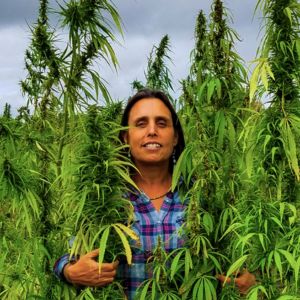Source: insidesources.com

Winona La Duke and hemp plants, in a promotional image.
Winona La Duke believes strongly in the need to return to a greener way of living. An environmental activist, she has been a vocal and visible protester for a variety of pipeline projects, including Enbridge 3 and the Dakota Access Pipeline. For her most recent project, however, she wants to protect water by changing the way we farm. La Duke just concluded a month-long online crowdfunding campaign to fund a 40-acre industrial hemp farm in northeastern Minnesota, having raised more than $130,000. La Duke’s project is a mix of environmentalism and native rights activism.
“I am going to work with my community and allies, to make jobs which are local jobs, non toxic jobs, and jobs which will change our world. My interest is in farming, reduced petroleum economies, and hemp. I am interested in [cannabinoids], some of the healthy magic of the plant and I am interested in fiber for clothing and houses,” she wrote in an Instagram post thanking donors for pushing her project over its goal.
La Duke sees hemp cultivation as a way to strike back against industrialized agriculture by turning down the green path and away from “the scorched path of fossil fuels and GMO’s.” She plans to work the hemp farm using only horse-drawn implements and two horses.
“I have farmed small plots with my two percheron mares for years, and I plan to expand this work. I want to scale up and join the 400,000 other horse powered farming operations in North America, understanding the sacred relationship between life, power and the future,” La Duke writes on her Kickstarter page. “I would like to live well, I am interested in decoupling food and hemp from fossil fuels, and I am also interested in the quality of life which small scale farming creates.”
La Duke believes that working the land with horses changes her relationship with the land. Furthermore, she views any use of fossil fuels as inherently destructive. She is hopeful that her small-scale hemp farm will help to reintroduce horses into agriculture.
Whether that will be economically feasible is another question. Prices for industrial hemp still lag behind other commodities. Her hemp farm plans to raise the fiber for cloth and paper. Right now, industrial hemp growers primarily sell the seeds for food or oil, both of which are more profitable than selling the fibers. Since industrial hemp was illegal for so long, the U.S. lags behind Canada in terms of processing facilities.
La Duke’s project is a boutique version of broader agricultural research. Industrial hemp was grown in Minnesota through the 1950s, when farmers switched away from it in favor of more profitable cash crops. For decades afterward, the cultivation of industrial hemp was banned under federal law because of its similarity to cannabis. Industrial hemp is defined as a strain of cannabis sativa that contains no more than 0.3% THC, the intoxicating ingredient in marijuana. In 2014, the federal farm bill was amended to define industrial hemp as separate from recreation or medical cannabis and to allow state agricultural departments the authority to regulate its cultivation.
Minnesota began a hemp cultivation pilot project in 2015. That year, about 40 acres of industrial hemp were cultivated in the state by six different growers. In 2017, there were 42 applicants for the pilot program and 2,200 acres of industrial hemp under cultivation. With the increase in industrial hemp growers, the state is also adding processing facilities.
Earlier this year, a processing facility for industrial hemp was established in the small town of Olivia, in west-central Minnesota. The processing plant will make items including roasted hemp hearts (a snack food), cold-pressed hemp seed oil, and hemp flour. State officials are encouraging industrial hemp production, explaining that Canada currently has an edge on the U.S. in the hemp production and processing market. Since the Olivia plant will not process hemp for fiber, a local economic development council is exploring options to bring in a second processing plant.
For La Duke, the goals of the project are many. Her social media describes how hemp can heal the earth, help the tribal economy, and serve as a medical remedy, the latter a stretch given industrial hemp’s low THC levels. It seems that the post-industrial future is starting small, with 40 acres and two mares.
No comments:
Post a Comment